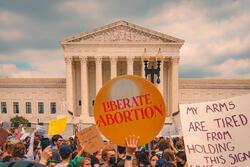At 35, Dirty Dancing is More Than a Sexual Coming-of-Age Story
Dirty Dancing—the greatest dance and coming-of-age film of all time—turned 35 this month.
It makes sense that it first appeared to the world in the sticky, nostalgic third week of August, a time of heat and change and leaving the dizzy fantasy of summer for the structured reality of work and school. Frances “Baby” Houseman (Jennifer Grey) is, in fact, on her way to her freshman year at Mount Holyoke when she first encounters Johnny Castle (the inimitable Patrick Swayze) at Kellerman’s Mountain House in the Catskills in the summer of 1963. There, she experiences an enviable summer romance that pushes her out of her proverbial corner and into her confidence and maturity.
There is so much to say about Dirty Dancing as a sexual coming-of-age story. I’ve described it previously as “a feature-length thirst trap with arms, legs, and a heart.” Baby learns about herself and what she likes through her relationship with Johnny, who is nothing less than a Greek god and Renaissance Man, a type that Patrick Swayze played better than anyone ever has.
But Dirty Dancing is more than just onscreen, PG-13 erotica, and it tracks more than just a young woman’s sexual awakening. Baby’s transformation is also moral—and extremely Jewish.
Besides an incredible soundtrack, electrifying dance sequences, and unforgettable romantic chemistry, Dirty Dancing is also notable for its depiction of a pre-Roe, illegal abortion that nearly kills Penny, the character who undergoes the procedure. Jewish screenwriter Eleanor Bergstein spoke to the Greenwich International Film Festival about why she included the abortion:
"I think you can make a brilliant black-and-white documentary [about] abortion, and everyone who sees it probably agrees with you before the first frame. But if you make a movie in color with pretty people and music and sensual dancing and a beautiful, blond young girl with a face like a delicate princess having no choices and screaming in a hallway under a dirty knife — maybe you'll change somebody's mind about what they assumed before."
At around the time Bergstein was writing Dirty Dancing, the legality—and morality—of Roe v. Wade was publicly challenged by the staunchly conservative Reagan administration Bergstein likely felt obligated to share the reality of what happens when healthcare is politicized and pushed outside of the law and behind closed doors.
Baby’s journey takes her from the upper-middle-class, homogenous comfort of a resort guest to the freedom, diversity, and sexual liberation of the working class Kellerman’s entertainment staff. She’s equally fascinated by dance partners Johnny and Penny the first time she meets them, watching how they express their sexuality openly even though they’re not in a sexual relationship.
When Baby finds out Penny is pregnant, her instinct is to assume Johnny is the deadbeat dad who won’t help her raise the child or “take care” of the “problem.” Her world opens up when she realizes the father is actually Robbie, the rich, Ayn Rand-loving, Harvard student and Kellerman’s waiter her sister Lisa has her eye on. People in high places, she realizes, can and do make destructive decisions, and they often leave vulnerable people to deal with the consequences.
Though much of the film focuses on her sexual awakening, Baby’s first act of defiance against the easy privilege of her youth isn’t actually romantic. Not wanting Penny to deal with her accidental pregnancy on her own, she tries to get Robbie to come through with the money for the abortion. When that approach fails, Baby jeopardizes her close relationship with her father (played by Jerry Orbach, one of the great film dads) by asking him to give her the money for the procedure without asking any questions. Baby knows it’s wrong to force Penny to go through with a pregnancy that will destroy her life, body, and career as a dancer, and she begins to understand that law and morality do not always exist on the same axis.
This is part of what makes Dirty Dancing so delightfully Jewish. It’s not simply that the film is “pro-abortion rights.” It’s an overstatement and an oversimplification to refer to abortion as a Jewish value. Many Jews believe abortion is a moral imperative if it saves the mother’s life; many Jews also believe abortion is not justified outside of that context. To make any grand statement about Jewish values flattens the diversity of opinion across many different Jewish communities with different avenues of observance and political thought. We are not and have never been just one, static thing.
I believe abortion is a human right, and I believe abortion is a Jewish value insofar as moral debate and questioning unjust laws is a Jewish value. In that way, I believe Baby’s moral reckoning with Penny’s abortion is a facet of her Judaism. Doing what’s right is often different from doing what is legally acceptable, and Baby choosing to risk her reputation and relationship with her father to save the life of a virtual stranger is astoundingly brave and a mitzvah if I’ve ever heard of one.
After the illegal abortion goes south, Baby must once again involve her father, a doctor, in illegal activities. Dr. Houseman is hurt that Baby couldn’t tell him what the money was for in the first place, but he fixes the botched procedure on Penny to save her life regardless. We never learn Dr. Houseman’s personal feelings about abortion; we learn simply that he is the kind of doctor who saves a person’s life, regardless of the circumstances that led to their injury or illness. Where he could have refused to care for a person in need (as many doctors are doing now in this post-Roe world), Baby sees her father stick to his Hippocratic oath and do the right thing, even though the easier thing might have been to recuse himself entirely from culpability in what was technically a crime.
Dirty Dancing is a love story, but it is also a powerful tale about the dignity of personal choice. As we navigate this terrifying post-Roe existence, I hope new viewers stay empowered to do right by people in need.







